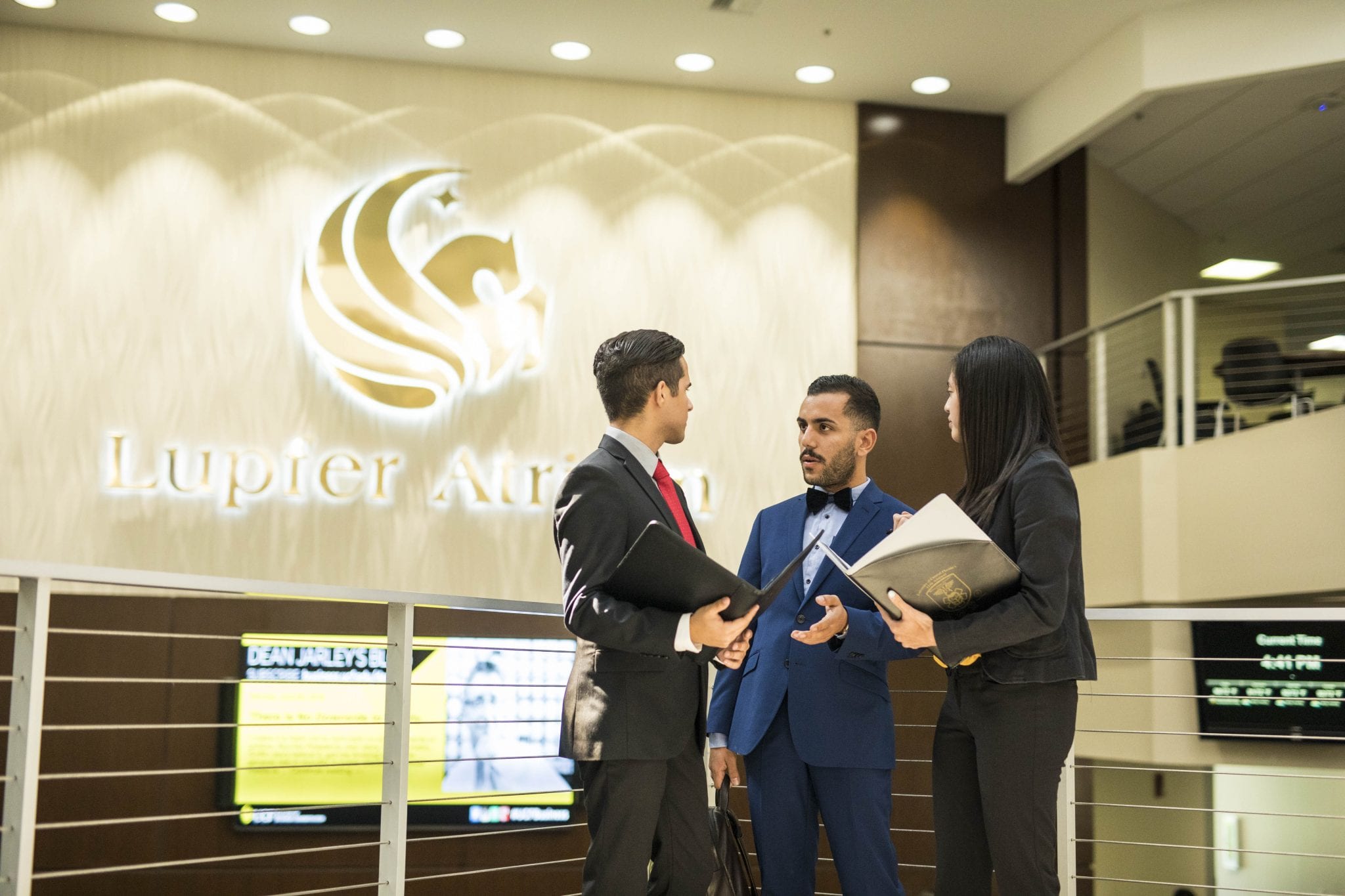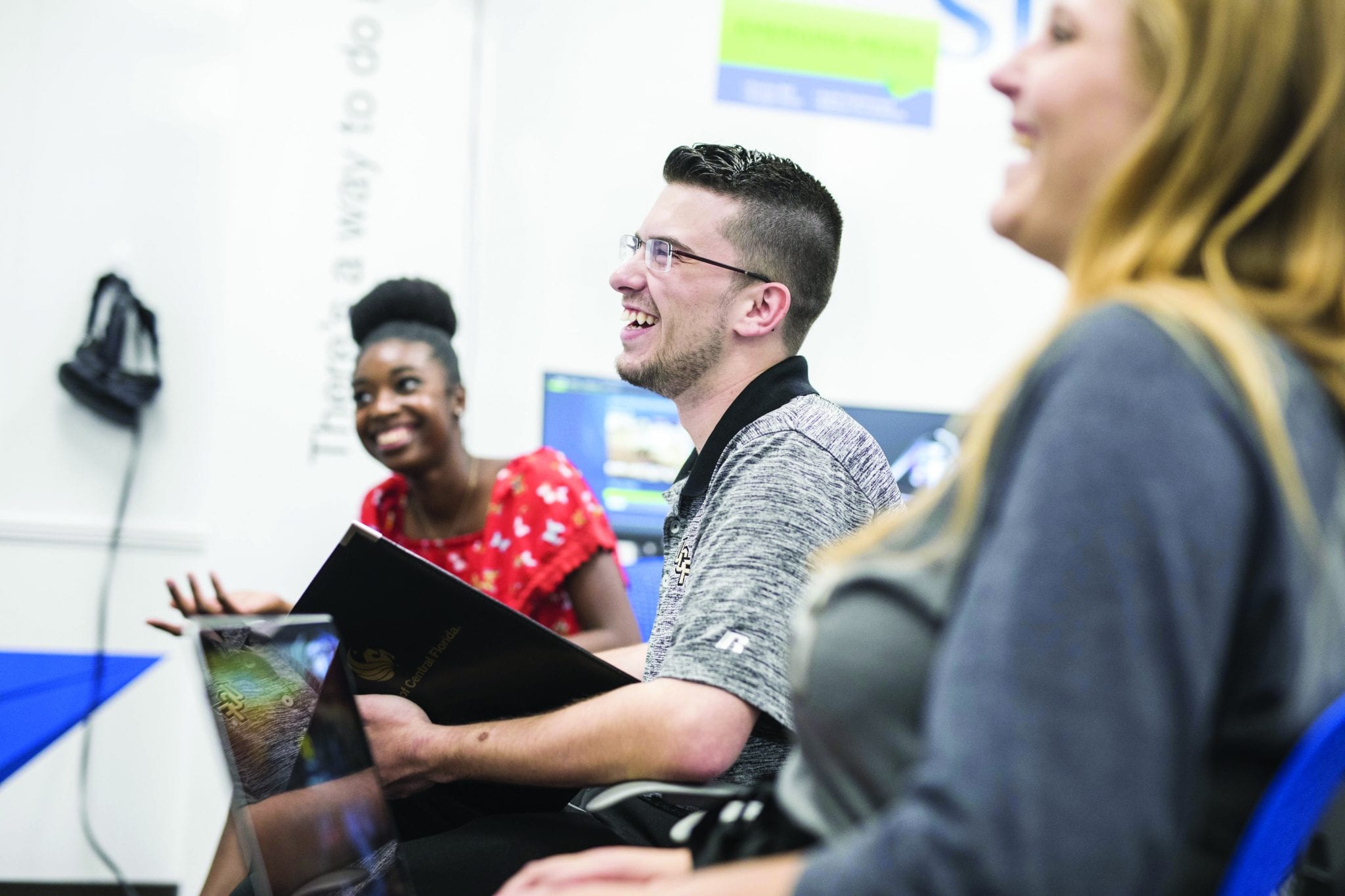It’s rare to find such a rich blending of research, partnerships and entrepreneurial talent in one place — and this is a picture of how it works in real life.

ELEVATOR PITCH
In any given week, more than 9,000 students and 125 faculty members are engaged in some sort of networking around UCF’s College of Business. The energy is profound enough to attract innovation leaders from the school’s 300 business partners on a regular basis. They come not because they have to be here, but because they want to be here.
OUR STORY
“They’re drawn to an environment where we’re constantly moving and creating,” says Paul Jarley, dean of UCF’s College of Business. “Skill sets are being groomed in collaboration with leading-edge experts in a diverse range of interests. And it’s fun because the anticipation of a rapidly changing economy is viewed with enthusiasm rather than fear.”
While business people mentor and advise on campus, students and faculty daily take their talent and ideas out into the Orlando region, blurring the line between the university and the community. It’s little wonder why UCF is the No. 1 supplier of business talent in Central Florida. The DeVos Sport Business Management Program is ranked among the top five graduate programs in the world. The Professional Selling Program is considered one of the best in the nation. All of this is an outgrowth of a College of Business that, as Jarley says, “is nondenominational. There are no walls between our business students, our business partners and forward-thinkers in areas like engineering, science and medicine. We can exchange knowledge and research without the constraints of disciplines and trends. That’s how we all become innovators and entrepreneurs.”
Two programs at the College of Business exemplify how UCF students are trained to lead the economies of tomorrow, whatever they might be.

CENTER FOR ENTREPRENEURIAL LEADERSHIP
You could make a case that no school and no business region has a better understanding of looking into the future than UCF and Orlando. UCF was founded in 1963 near the Space Coast to develop innovative solutions and foster new ventures that help us reach for the stars. So entrepreneurship has always been part of the culture, not just in terms of starting a business but in a mindset trained to imagine and create a better future.
“Being an entrepreneur today means being prepared for a career that will take all kinds of unexpected turns,” says Cameron Ford, director of UCF’s Center for Entrepreneurial Leadership. “We use words like adaptable, agile and resilient. The best way to develop those skills is by connecting problem solvers with common interests, diverse expertise and lofty aspirations about making things better.”
The CEL hosts the only Blackstone LaunchPad powered by Techstars entrepreneurship programs in Florida. Approximately 1,000 students seek one-on-one startup coaching at the LaunchPad each year. Our coaching and startup resources empower students from all disciplines with entrepreneurial mindsets and skillsets and help more than 30 student-led ventures launch each year. “Our faculty, coaches and mentors are like skilled Sherpas who help students explore their potential and achieve success,” Ford says.
Dozens of small businesses also point to the center’s Joust New Venture Competitions as their breakout moments, including Talon Simulations (motion simulators), O’Dang (hummus-based condiments), and Capacitech (supercapacitors). Judges of the competition come from the business world and are often engaged with UCF as mentors, guest speakers, and program sponsors.
Employers are searching for resourceful, entrepreneurial leaders capable of creating and realizing new initiatives that solve problems, create value and sustain success. The CEL empowers students from all disciplines to pursue the power of their own ideas and make a positive impact on society.”
REGIONAL ENTREPRENEURSHIP PROGRAMS
UCF’s community-facing entrepreneurship programs could serve as a model nationwide — if only they could be replicated. The university’s scale allows the programs to broaden their impact, and UCF’s nationally recognized research disciplines align closely with the industry strengths of the region. Investing in focused innovation districts in the research park adjacent to the campus, at Lake Nona, and in downtown Orlando will accelerate the growth and impact of these tech-focused clusters on the regional economy.
“The innovation economy of our region is accelerating, and our entrepreneurship programs ensure that we keep our foot on the gas pedal,” says Thad Seymour, UCF’s interim president, vice president for partnerships and chief innovation officer. “We have experts and resources to help innovators create and launch scalable startups, to grow businesses that already exist, and to help bigger companies expand in Central Florida.”
As an example, the UCF incubation program has assisted more than 350 emerging companies in at least seven communities as distant as Daytona Beach and Apopka. Those companies have created nearly 5,000 jobs and generated a regional economic output of $2.5 billion.
“We always have an eye on the future,” Seymour says. “To thrive we must diversify the region’s economy while continuing to grow those industries that got us here. With our partners, UCF is committed to supporting small businesses, which are the lifeblood of a vibrant economy. At the same time, we must be aggressive in launching and growing tech-based companies that will create large numbers of high-wage jobs in the future.”
Vibrant economies are built on the essential ingredients of talent, ideas, and capital. As land grant universities did for agriculture in the 19th century, UCF is focused on providing exceptional talent and innovative ideas that help produce broad-based prosperity in emerging industries and those that may not even yet exist.
“Engineers say innovation comes from the lab,” Jarley says. “Business students say innovation comes from the need of the customer. Both are right. And we have the best of both right here. Add our world-renowned research and sciences, and those ideas become commercially scalable and viable. It’s been happening here for years. That’s why I can promise you the future in Central Florida will not be boring.”













